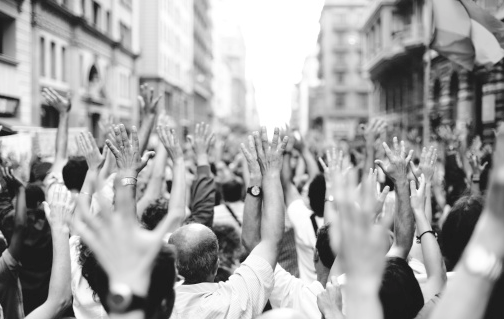Stephanie Henning
![]()
In the weeks and months since Michael Brown’s tragic death at the hands of police officer Darren Wilson, I have succumbed to a numbness. A numbness brought on by feelings of powerlessness, helplessness, anger, and sadness—heightened by the crushing weight of just how wrong it all is. Wrong that Michael Brown was killed, and Eric Gardner, and Tamir Rice, and John Crawford, and so many others. Wrong that I can count on the police to help me when I need it, but too many others can’t.
I consider myself a white ally to the #blacklivesmatter campaign, but recently I’ve been asking myself: “what does it actually mean to be an ally?â€
In more formal contexts, allies are bound by treaties or contracts and bring mutual benefit to the partnership. As a social justice ally, I often struggle to understand what benefit I can bring or what impact I can have. There is no one person or organization to which I can turn for direction, no single document I can sign committing my support and resources to the movement. But maybe I have been thinking about this all wrong. Maybe what social justice needs is not simply allies, but responsible alliances.
In a piece for her blog FreeQuency, activist and poet Mwende Katwiwa asks white allies to think more critically about their role:
“I understand wanting to show up and support, but white people need to understand that this symbolic act of raising your hands in a position of surrender is meant to illustrate how black people are violently targeted by police because of their race. If you don’t experience that, you should not mimic the gesture in an attempt at ‘solidarity’. It is centering yourself in a narrative that you cannot tell because of the protection your white privilege gives you.â€
Katwiwa’s critique does not preclude white allies from participating in protests but rather suggests that when it comes to showing support and solidarity, what you do is secondary to how you do it.
To borrow a concept from the theatre world, as allies we have a responsibility to give focus to the principal players. When you’re on stage, everything from the lighting to the set and the staging conspire to produce a single effect: focus. Directors have numerous tools to make sure the audience is focused where they want, when they want, on whom they want. Actors, however, have a responsibility not only to respect this focus, but to actively give focus to the characters at the center of the narrative. Everything you do on stage, you do while simultaneously giving focus elsewhere. If you move too much, set down a prop to loudly, or disengage from the performance, the audience will notice, and they will no longer be looking where they are supposed to look. They will be looking at you.
In social justice movements, there are no directors to decide where the focus belongs. The omnipresence of social media and the plurality of news outlets mean any individual can take focus if they want. As allies, our responsibility, however we choose to show our support, is to do so while still giving focus to the community with whom we are allied. When you share videos on Facebook, is it always Jon Stewart and never Melissa Harris-Perry? Who authored the articles you share? How do you participate in a protest to avoid becoming the story?
When new research shows fewer than 1 in 5 white Americans believe race was a major factor in the non-indictments of the police officers who killed Michael Brown and Eric Gardner, those of us who consider ourselves white allies have a responsibility to act. As members of the politically, socially, economically, and numerically dominant group, we, as white people, are privileged, and with that privilege comes power. Just like the chorus line, we, as white people, have power to distract and take focus, or we can fulfill our role and use our power to give it away.
All Wagner students interested in large-scale discussion about how to improve the presence and treatment of diversity at our school can join the Wagner Diversity Council. Contact Simone Andrews for more information.
Stephanie is a first year MPA-PNP student. She brought her linguistics background to Wagner to work on language policy and indigenous rights. Tweet her at @wingedrecliner. She probably won’t tweet back.




